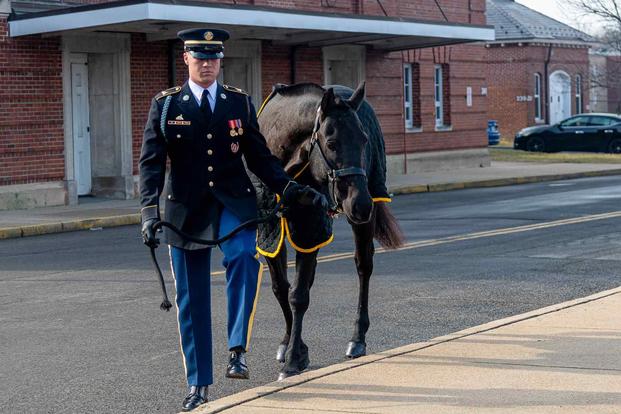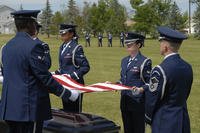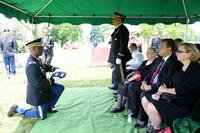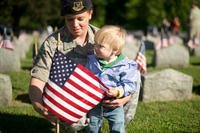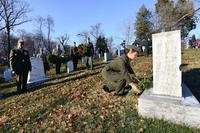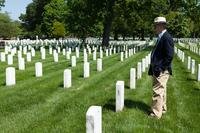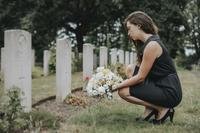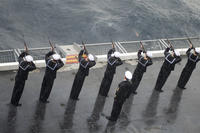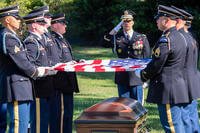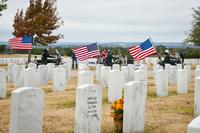The Army says it will continue the suspension of horse-drawn funeral services at Arlington National Cemetery after roughly a year of no operations, leaving some family members with a tough decision on how they want to honor their service members.
The timeline for when those services will resume is unclear, officials said Friday. The original suspension followed a string of military working horse deaths, reports of unsanitary and potentially life-threatening living conditions, as well as congressional scrutiny directed at the Army's 3rd Infantry Regiment, also known as "The Old Guard" -- the service's premier ceremonial unit, which is in charge of conducting the horse-drawn services.
The Army and Arlington National Cemetery officials on Friday assured the public that there were no families awaiting services due to the suspension. After Military.com contacted one family that was waiting for caisson services, those officials initially doubled down on the claim, only to walk it back days later.
Read Next: Troubled USS Boxer Returns Home 10 Days into Deployment Due to Maintenance Issue
"We apologize for any confusion last week and regret any further emotional stress that families awaiting the caisson may have endured," Kerry Meeker, the chief of public affairs for Arlington National Cemetery, told Military.com via email on Tuesday. "We will continue to review our case records to determine if there are any remaining families who have opted to wait for the return of the caisson."
After speaking with the family Military.com interviewed, Arlington officials also said that following "a more thorough review," they are now tracking "a few families" who are waiting for the return of caisson services to potentially escort their loved ones to their final resting places.
The caisson platoon consists of military working horses that pull caskets of fallen service members to burial plots at Arlington National Cemetery. The unit is part of The Old Guard and, according to officials Friday, has and will continue to undergo several changes -- such as improved feed and work cycles -- in the wake of those deaths and reports of mistreatment.
In April 2023, Military.com first reported that the caisson platoon would be suspending horse-drawn casket operations for 45 days to conduct an internal review of the equine's health. That review found that more than half of the 48-member herd had muscle, joint or hoof issues. After that review, officials decided to stand-down caisson support for a year.
When the caisson service will return, and when families will know whether they can utilize it, is still a question.
"I personally recognize and appreciate the impact that this holding in caisson operations has had and continues to have on military families and veterans," Maj. Gen. Trevor Bredenkamp, commander of the Military District of Washington and Joint Force Headquarters-National Capital Region, said Friday.
"This extension is necessary," he said. "We have to ensure a sustainable program in order to maintain the trust with the American people."
On the same day, Charles Alexander, the superintendent of Arlington National Cemetery, said that of the 700 funerals scheduled or to be scheduled, "there are no families that are waiting for a service due to the suspension or the extension."
That proved untrue. Military.com spoke to one family on Friday that said they had been waiting for more than two years to inter their loved one, an Army colonel who died in 2022. The family grew up with horses and was looking forward to giving their loved one full honors with a caisson escort.
"Horses were part of our lives," one of the family members told Military.com. "This is more than just, 'Well, sorry, we can't do this,' ... it's just really disappointing."
Military.com followed up with Arlington Friday, asking about this family's case -- the family wished to remain anonymous in reporting and to Arlington National Cemetery at the time. Alexander said then that he stood by his previous statement that no families were waiting.
"If this family exists, yes, we want to get their loved one scheduled as soon as possible," Alexander said. "But beyond that, I don't know what value this serves, other than perhaps to sensationalize this."
On Tuesday, the family connected with Alexander and another Arlington official. A family member told Military.com after the conversation that it was "positive" and that they were satisfied with the outcome, though still facing a decision on whether they want to wait for the caisson to return or continue with honors without horses.
Meeker, the spokesperson for Arlington, said the discussion was positive after Alexander personally spoke to the family.
"He apologized for not being aware they were awaiting scheduling until the caisson's return, and for any inconsistencies in the clarity or accuracy of the information provided by our scheduling team Friday when the Army announced the continued suspension," Meeker said. "He committed to them that their loved one's service will be conducted with the same level of dignity, compassion and precision in the absence of the caisson, but advised that they may continue to wait if they choose to do so."
Meeker said Arlington will be contacting other families who have opted to wait for the caisson return to see if they want to continue to hold their services, given the news that the suspension of the caisson will continue.
Officials could not give an estimate of when that suspension would lift, though Bredenkamp said that the decision to resume operations would be "conditions-based" and did not expect the extension to last multiple years. Those conditions include factors like how many new horses the unit can procure to replace those who have retired, aged out or were adopted.
It also centers around fine-tuning training and rest cycles, which officials said were overburdened before experts and lawmakers leveled scrutiny at the unit. Before April 2023, the caisson horses were doing 6-8 funerals per day, every two hours, according to officials.
"What we've learned is that the more appropriate work-rest cycle is no more than five hours under saddle and tack in a day," Bredenkamp said. "So, that reduces the amount of funerals we can support with those squads."
In 2022, CNN reported that two horses died within just days of each other and that the herd was living in small, unsanitary conditions, consuming low-quality feed and suffering from parasites. Within nine months of those deaths, two other horses died, totalling four in less than a year.
Following those deaths, the unit started rotating horses to a larger plot of land in Virginia in conjunction with the Bureau of Land Management. One of the challenges that officials and soldiers who care for the horses have grappled with is the lack of organic space at Fort Myer and Fort Belvoir, where the horses live and train. In 2022, the Army said the then-60-member herd was living in less than 20% of the space equine experts recommend.
"It just became very cost-prohibitive to be able to expand the relatively small facility we had at Fort Belvoir to accommodate a larger herd," Bredenkamp said. "And we're not going to get any more in Fort Myer."
Over the last year, the number of horses began to dwindle as some were adopted out of the unit, which meant those remaining had more space as the unit looked for alternatives to the tiny six-acre pasture complex at Belvoir. Two years ago, the herd numbered around 60, which crowded the limited space they occupied at the two bases. Now, the herd totals at 42, which includes 18 new horses since June 2023.
Currently, the dozens of caisson horses are residing at the Northern Virginia Equine Center, which has about 52 acres of turnout and 47 stalls, according to officials. Bredenkamp said the Army Corps of Engineers is working to solicit potential locations, and that the unit is "evaluating a variety of options" for a permanent solution to the space issue.
One of the challenges is horse procurement, according to Bredenkamp, as they are required to be a specific breed and have a specific temperament. He said that getting new horses "has proven to be a little more challenging than we initially anticipated;" more horses means less work burden for the herd, but it also means that more space is required to house them.
Lack of funding was also noted in the original Army documents that spurred the CNN report. Since then, the caisson platoon received $15 million in congressional funding. In fiscal year 2023, the caisson platoon spent about $7 million in rehabilitative care, improved feed and nutrition, clinician care and procurement of horses.
The unit is also looking at options to create a specific military occupational specialty aligned with caring for, training with and executing missions at Arlington National Cemetery, Bredenkamp said. Other options include expanding civilian contracts or extending the on-station time of soldiers charged with their care.
Related: Army to Suspend Operations at Embattled Horse Unit but Promises No Impact to Arlington Funerals
